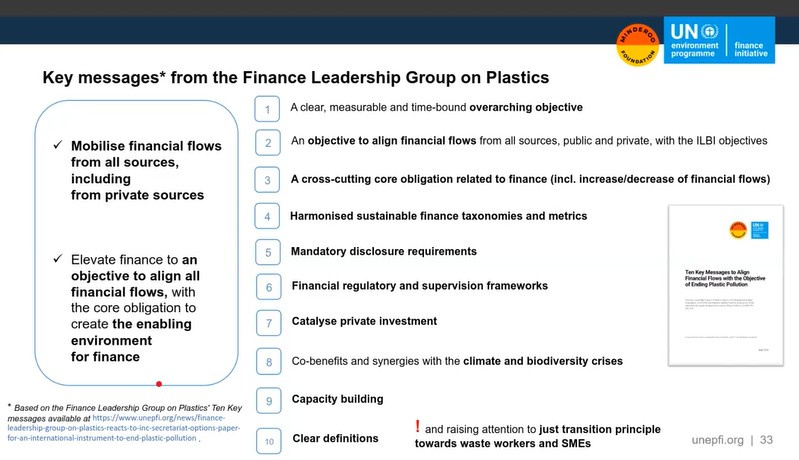Financial institutions have been invited by the UN Environment Programme Finance Initiative (UNEP FI) to sign a statement calling on governments to introduce mandatory corporate disclosures on plastic pollution.
The Finance Leadership Statement on Plastic Pollution comes ahead of the fourth round of negotiations for an instrument to end plastic pollution, including in the marine environment, in April in Canada from the Intergovernmental Negotiating Committee.
“The financial sector calls for an ambitious international legally binding instrument to end plastic pollution, and sets out what a robust agreement would include,” the statement said.
The treaty should include “consistent mandatory disclosure requirements” for corporations building on existing voluntary frameworks like that of the Taskforce on Nature-related Financial Disclosures, the statement said.
“As signatories to this statement, we each acknowledge that the financial sector can have a role in mitigating the material financial risks related to plastic pollution through our financed activities and investments, where to do so is consistent with relevant legal frameworks and aligned with our fiduciary duty.”
The statement is led by UNEP FI, Principles for Responsible Investment, Finance for Biodiversity Foundation, the Business Coalition for a Global Plastics Treaty, the Dutch Association of Investors for Sustainable Development, and CDP.
Investors, asset managers, asset owners, banks, and insurance companies, financial industry associations, and other finance-related initiatives, have been invited to sign the statement by Apr. 10.
FINANCE RESPONDS
Joost van Dun, representative of the UNEP FI leadership group on plastics, emphasised the importance of a mandatory framework to align financial flows from public and private sources in tackling plastic pollution, during a webinar.
“That means that we want to increase financial flows to initiatives that have positive impacts in fighting plastic pollution,” said Van Dun, who is also director of sustainable finance and circular economy lead at Dutch bank ING.
“To realise that we have also defined multiple enablers, such as clear definitions, and also the harmonisation of sustainable finance taxonomies to make sure that we all talk the same language.”
Source: Joost van Dun
Chloe Maury, ESG analyst at Amundi, the largest asset manager in Europe, said finance needs to incorporate a robust assessment of plastic-related risks and opportunities into investment analysis.
These risks come from local legislation, reputation, and the climate transition to a lower carbon global economy, Maury said during the webinar.
“Companies still lack transparency on information related to plastics. For instance, disclosing information on type of plastic used, plastic intensity.”
THE STATEMENT
Signatories to the statement call on governments to end plastic pollution by points including:
- Reflect co-benefits of tackling plastic pollution, climate action, and biodiversity preservation and restoration across policy
- Set binding obligations for targets across the plastics value chain
- Ensure companies disclose plastic-related risks and opportunities through mandatory disclosure requirements
- Introduce public-private partnerships, blended finance, and de-risking mechanisms to catalyse private investment
Financial signatories also express “willingness” to actively address the risks of plastic pollution through their investments, though the statement is not legally binding.
The fourth round of plastic talks follow the third round in Kenya in November, where negotiators failed to achieve the goal of agreeing a draft treaty text for approval in 2024.
Observers blamed the failure on influence from industry lobbyists, of which there were more than 140 at the talks, and a lack of drive among developed countries. The ambition of the final agreement remains unclear.
Last September, standards body Verra called for plastic credits, such as the ones it issues, to be an integral part of the treaty.
By Thomas Cox – t.cox@carbon-pulse.com
*** Click here to sign up to our twice-weekly biodiversity newsletter ***




